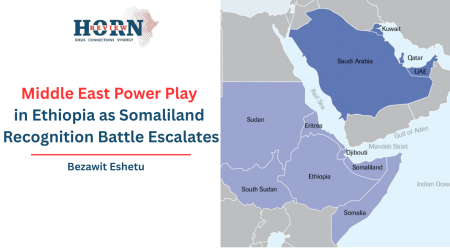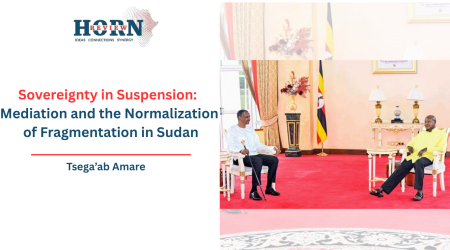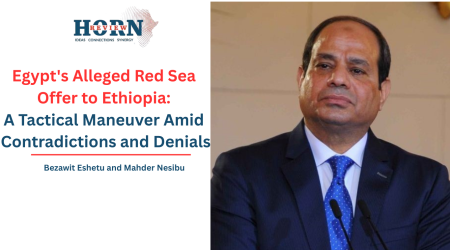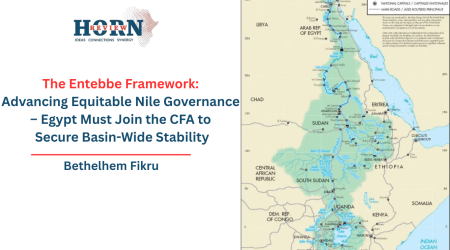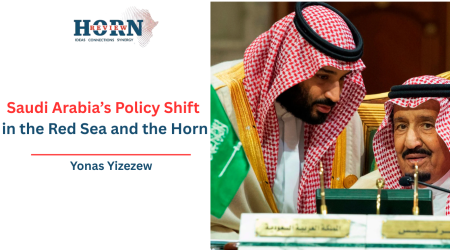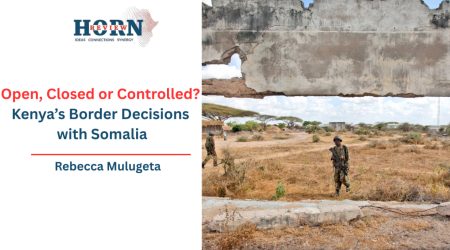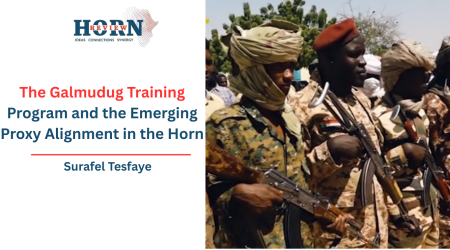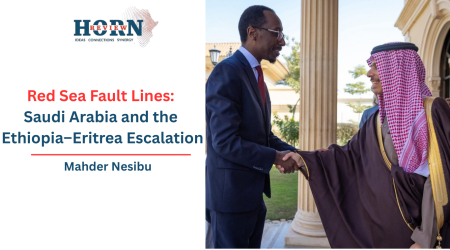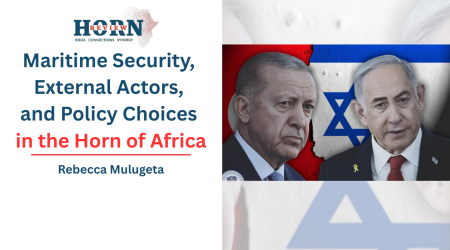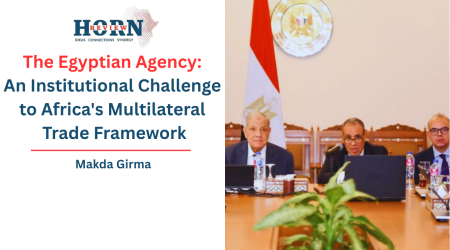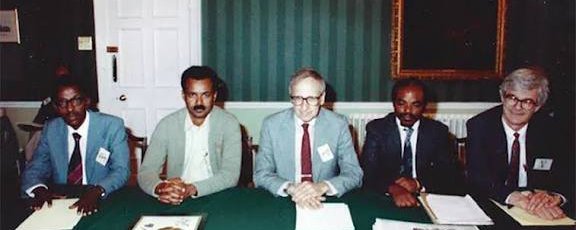
30
Sep
Eritrea Unraveled: The Case for Ethiopia’s Reversal Of State Recognition
Ethiopia’s recognition of Eritrea’s secession in 1993 was framed as a landmark gesture of reconciliation, signaling that decades of civil war had reached a turning point and that a new era of cooperation could emerge between the incoming Tigray People’s Liberation Front (TPLF) led government in Addis Ababa and the Eritrean People’s Liberation Front (EPLF), its wartime ally against the Derg regime. At the time, recognition was politically expedient for both the TPLF and EPLF leaderships, yet it was morally contested and widely resented by Ethiopians at home and abroad. Eritrea had waged a long and bloody war under the banner of “self-determination,” and Ethiopia, exhausted by protracted conflict, extended the hand of state-to-state legitimacy – what international law often describes as the “Mother State’s Permission”.
However, such recognition or sovereign state consent was granted by a transitional government with no legitimate mandate to do so, and without the proper safeguards of Ethiopian state procedure. Meles Zenawi and his colleagues in the TPLF-led government never brought the matter to parliament for ratification, nor did they seek to confirm the political will of the Ethiopian people through any legitimate process.
This unilateral concession ignored the explicit warnings of American and other Western partners, who advised Ethiopia to delay recognition until clear demarcation of the border was secured. That failure to address unresolved territorial questions sowed the seeds of conflict, culminating in the 1998–2000 Ethio-Eritrean war – a devastating reminder that premature recognition, extended without due process or strategic foresight, carried heavy consequences for Ethiopia’s sovereignty and security.
That said, it is important to note that the legitimacy of Eritrea’s statehood in international politics was heavily anchored in TPLF’s political will that led to Ethiopia’s consent to grant statehood to Eritrea. Such recognition was the essential signal that enabled other states, and international and regional bodies to treat Eritrea as sovereign. Absent that consent, Eritrea would likely have faced the same fate as entities such as Somaliland’s brief independence in 1960, Catalonia’s attempted secession in 2017, or Biafra’s declaration in 1967 – and more instances where recognition without the acquiescence of the mother state met strong resistance or quickly collapsed.
The Biafra case is especially telling: although a handful of states extended recognition, the absence of Nigeria’s consent rendered that recognition fragile and unsustainable, and Biafra was eventually reabsorbed. These precedents underscore a broader reality: recognition without mother-state approval rarely endures, while with it, even contested claims can gain traction. The UN, EU, or AU explicitly conditioned the above states’ admission on their sovereign’s recognition, including that of Eritrea’s. Hence, such a broader pattern of international practice indicates that Ethiopia’s grant of legitimacy was indispensable – not a mere formality, but the decisive factor that transformed Eritrea from a rebel movement into a recognized state.
Three decades on, however, the optimism that initially underpinned that recognition has proven gravely misplaced. Eritrea has failed to mature into a responsible neighbor or a viable state in any meaningful sense. Instead, it has entrenched itself as a destabilizing force, consistently undermining Ethiopia’s security, obstructing its development ambitions, and aligning with adversarial powers such as Egypt to contain Ethiopia’s influence and block its maritime aspirations.
In light of this trajectory, a difficult but unavoidable question emerges: can Ethiopia be expected to uphold recognition indefinitely when the very state it legitimized has turned into a dysfunctional entity, and a source of instability and unceasing hostility?
The legal and strategic grounds for raising such a question are not without foundation. Recognition of a state is, at its core, a sovereign and discretionary act; it is neither permanent nor irrevocable. International law does not bind a state to perpetuate recognition if the conditions that justified it in the first place have eroded. History offers numerous precedents: the diplomatic shift from Taiwan to the People’s Republic of China, the dissolution of recognition for East Germany upon reunification, or the withdrawal of recognition from entities that collapsed, ceased to function effectively as states, or acted malignantly.
A striking African precedent can be found in the case of Somaliland. Upon declaring independence from Britain in June 1960, Somaliland was briefly recognized by a number of states and even exchanged diplomatic relations. Yet within days, that recognition was effectively withdrawn when Somaliland opted to unite with the newly independent Somalia. The episode illustrates that recognition is not immutable: it can be extended, withheld, or even reversed depending on shifting political and strategic circumstances. This example is particularly relevant for Ethiopia, as it highlights that African state practice itself acknowledges the fluidity of recognition, undermining the assumption that once extended, recognition must endure regardless of subsequent developments.
Ethiopia, as the “mother state,” retains an even more exceptional legal and strategic standing in this context. The seceded Eritrean territory was legitimized with its consent, and when the assumptions underlying that consent are violated, the mother state can legitimately revisit its decision.
This is not merely a theoretical concern. It gains sharp relevance when measured against Eritrea’s actual condition, for the state has, by almost every standard, ceased to function in a manner consistent with international expectations of sovereignty. The Montevideo Convention lays out four core criteria for statehood: a permanent population, a defined territory, an effective government, and the capacity to engage in foreign relations. Eritrea today falters on nearly all of these. Its population is in free fall as indefinite national service, forced conscription, and mass emigration drive millions to flee – mainly to Ethiopia, Europe, North America, Uganda, Rwanda, Kenya and South Africa – draining the country of its youth and vitality. Governance is rigidly centralized under the EPLF, now turned PFDJ regime, which clings to power through militarized coercion rather than accountable institutions; Eritrea lacks both functioning constitution and institutions. It has not held an election since its secession in 1993, and lacks any credible mechanisms for enforcing law or delivering legitimate public services.
Economically, it remains stagnant, reliant on forced remittances from its exiled diaspora, extractive mining ventures, and coerced labor, while sanctions and isolation have only deepened its fragility. Even in foreign relations, Eritrea behaves less like a sovereign peer than an opportunistic spoiler – aligning with adversarial actors such as Egypt, not to promote stability or cooperation, but to constrain Ethiopia’s development ambitions and regional options.
If questions remain about whether Eritrea has collapsed as a functional state, its human rights record offers a decisive answer. Reports from Human Rights Watch and Amnesty International detail a grim reality: indefinite national service, forced labor that ensnares even minors, arbitrary arrests, systematic suppression of free expression, and a pervasive climate of fear that leaves no space for civil society. In 2024, the Fragile State Index ranked Eritrea among the most fragile and high-risk states globally, a reflection of the combined weight of political repression, economic stagnation, and societal breakdown. Militarily, the regime has funneled resources into the perpetuation of its own survival rather than the welfare of its people, consolidating power through a culture of coercion rather than accountable institutions. These are not incidental failings but structural ones: they reveal a state whose internal structures are hollowed out, whose legitimacy is derived not from consent but from coercion, and whose basic capacity to govern is effectively absent.
Equally concerning is Eritrea’s conduct beyond its borders. Far from acting as a stable neighbor, it has emerged as a persistent destabilizer in the Horn of Africa. For the past three decades, Eritrea has reportedly provided training, resources, and logistical support to insurgent groups within Ethiopia – most recently to the Amhara Fano Militia, the Oromo Liberation Army, and the TPLF faction that split into two after the Pretoria Peace Deal – thereby amplifying regional insecurity and prolonging hostilities. Its long-standing alignment with Egypt – an actor that historically facilitated the rise and operational capacity of the EPLF during the 1960s – cannot be read as mere regional cooperation.
Rather, it constitutes a deliberate strategic calculus aimed at circumscribing Ethiopia’s influence and perpetuating the structural containment embedded within the carefully orchestrated secession of Eritrea, ensuring that Ethiopia remains constrained both territorially and geopolitically. In addition, Eritrea has demonstrated a willingness to deploy forces near contested borders, escalating tensions and compelling Ethiopia to maintain defensive posture. Beyond Ethiopia, Eritrea has repeatedly acted against stable political establishments in Sudan, Djibouti, Somalia, and South Sudan, actively undermining efforts at peace, stability, and governance. In effect, Eritrea has established itself as a de facto anti-state – most particularly anti-Ethiopia – operating as a regional actor hostile to its neighbors and consistently obstructing Ethiopia’s security, development, and broader strategic ambitions.
From a legal standpoint, these realities provide compelling grounds for Ethiopia to reconsider its recognition of Eritrea. The conditions of statehood and the assumptions upon which recognition was granted are no longer satisfied. Eritrea has violated both the functional and normative expectations that accompanied its recognition, engaging in conduct that undermines not only Ethiopia’s interests but also broader regional stability. Even if it continues to exist as a nominal state, Ethiopia retains the sovereign authority to revoke recognition, guided by both legal principle and strategic necessity.
Strategically, revoking recognition would delegitimize a state that functions as a proxy adversary and signal that sovereignty entails accountability. It would also enable Ethiopia to reassert claims over a marginalized population with irredentist interest occupying critical territories. More broadly, it would reaffirm the norms of statehood and reinforce the principle that mere existence does not confer legitimacy, particularly when a state becomes a vehicle for repression, instability, and persistent interference in the affairs of its neighbors.
Revocation of recognition would also not be merely symbolic; although it would not immediately nullify Eritrea’s formal statehood, it would fundamentally alter its position in the Horn of Africa and recalibrate regional calculations. Historically, withdrawal of recognition has served as a diplomatic lever to compel renegotiation of boundaries, influence, or governance, as seen in cases such as East Germany prior to reunification or Pakistan’s conditional engagement with Bangladesh in the early 1970s.
For Eritrea, such a move would delegitimize unilateral claims to territory and sovereignty, especially in negotiations regarding Ethiopia’s pursuit of access to the sea, and restrict its ability to secure international support. Recognition has long been employed flexibly as a tool to influence the status of breakaway regions and negotiate border or governance disputes, particularly when a secessionist entity fails to meet the functional and normative standards expected of a sovereign state. Strategically, Ethiopia’s withdrawal of recognition would transform a static diplomatic acknowledgment into an active instrument of regional realpolitik, reshaping the balance of power and recalibrating incentives across the Horn of Africa.
Critics will undoubtedly raise objections. The principle of uti possidetis juris, which maintains colonial-era borders, might be invoked to argue against revocation. Eritrea’s continued membership in the United Nations could be cited as proof of legitimacy. There may be warnings that revocation would destabilize the Horn of Africa. Yet none of these objections fully withstand scrutiny. Uti possidetis presumes functioning, responsible states; Eritrea’s collapse and malign activity remove it from ordinary cases. UN membership indicates recognition by peers, not internal capacity, governance, or legitimacy. And the concern over instability must be weighed against the reality that Eritrea itself is a source of ongoing instability, exporting conflict, supporting insurgencies, and obstructing Ethiopia’s development.
Ultimately, Ethiopia’s decision in 1993 was made with the expectation of establishing peace and constructive cooperation; Eritrea’s conduct over the past three decades has transformed that expectation into a liability. Legally, Ethiopia retains the right to withdraw recognition. Strategically, it has every reason to do so. Eritrea has collapsed as a state in substance, it actively destabilizes the region, and obstructs Ethiopia’s legitimate security and development ambitions. Recognition is a revocable sovereign concession; and such sovereignty implies the capacity to reassess and respond when circumstances fundamentally change. Allowing Eritrea’s current trajectory to persist unchecked would be to accept that a dysfunctional, hostile, and repressive enclave may indefinitely constrain one of Africa’s largest and most dynamic nations. Revoking recognition would thus constitute a decisive assertion of law, strategy, and principle – reclaiming both sovereignty and the nation’s future.
Disclaimer: This essay is offered as a policy recommendation for consideration, in both the short and long term, highlighting the legal, strategic, and normative factors Ethiopia may weigh when assessing the prudence of revoking recognition of Eritrea. It does not, in any way, represent the official position or policy of Horn Review or its partner institutions.

